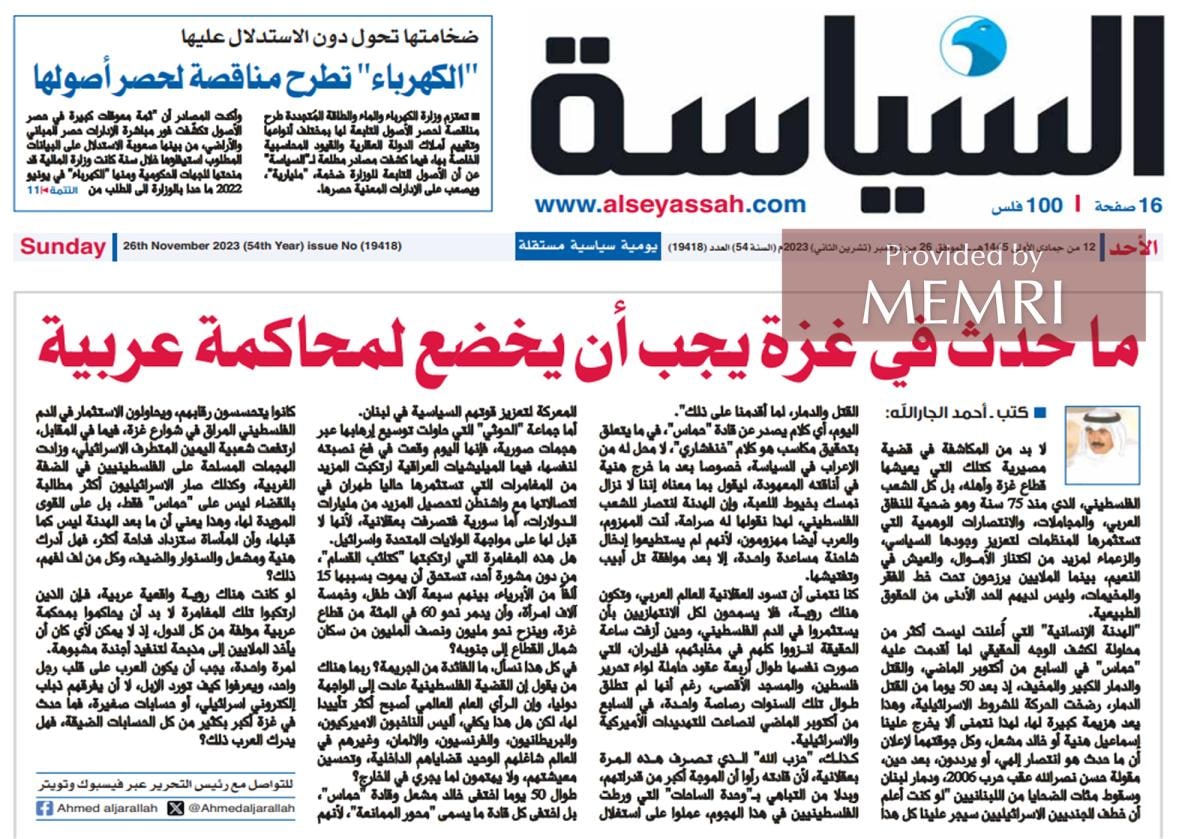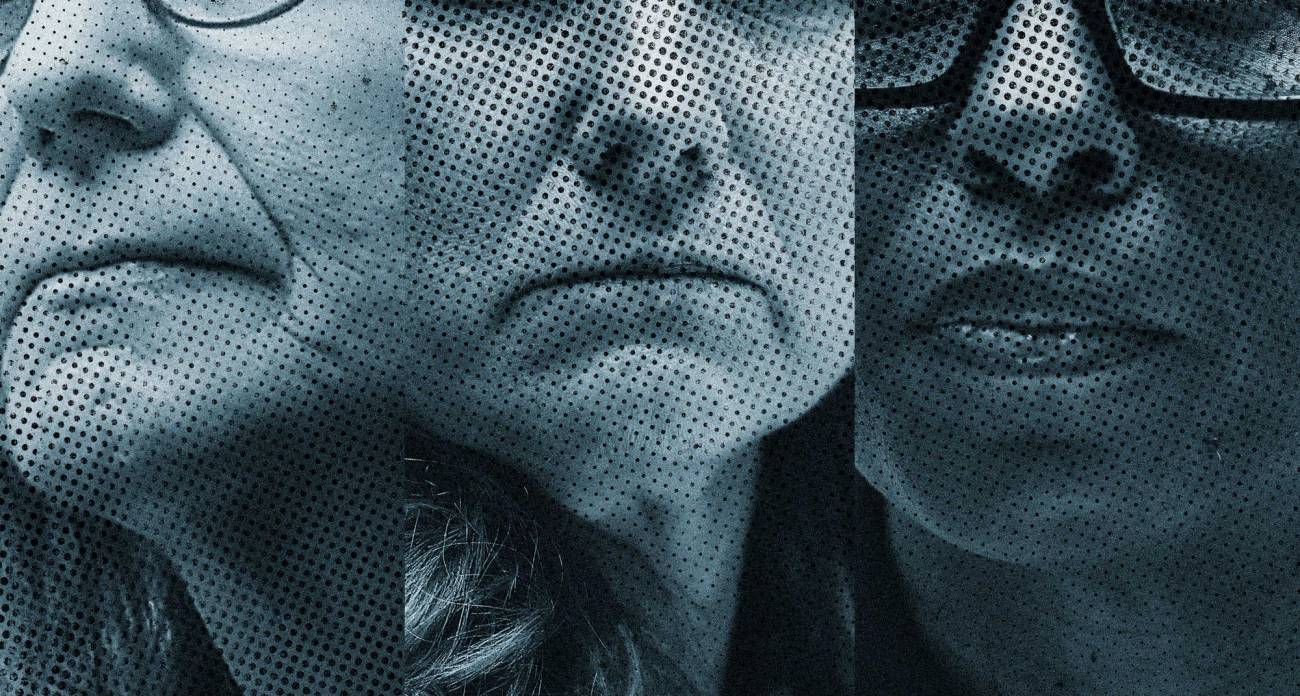 Redaktor gazety Ahmad Al-Dżarallah stwierdza w artykule w kuwejckiej gazecie „Al-Siyassa” z 26 listopada 2023 r., że atak terrorystyczny Hamasu z 7 października spowodował śmierć i katastrofę dla ludności Gazy, i wzywa do pociągnięcia jego przywódców do odpowiedzialności karnej. Pisze, że od 75 lat naród palestyński jest ofiarą arabskiej hipokryzji, fałszywych twierdzeń o zwycięstwie przywódców ruchu oporu i różnych oportunistów, którzy próbowali czerpać zyski z palestyńskiej krwi. Dodając, że obecne zawieszenie broni w Gazie [Siedmiodniowa przerwa w walkach armii izraelskiej z Hamasem w Gazie zakończyła się pierwszego grudnia o świcie, kiedy z Gazy wystrzelono salwę rakiet na Izrael – M.K.] odzwierciedla porażkę i uległość Hamasu – nawet jeśli jego przywódcy zachwalają to jako triumf i wyśmiewa siły osi oporu, na czele której stoi Iran, które nieustannie przechwalały się, że następna konfrontacja z Izraelem będzie wiązała się z „jednością frontów”, ale w chwili prawdy wszyscy ukryli się, aby ratować własną skórę. Al-Dżarallah zastanawia się, czy „eskapada” Hamasu z 7 października była warta śmierci tak wielu Palestyńczyków, zniszczenia Strefy Gazy i masowych wysiedleń, i stwierdza, że przywódcy Hamasu powinni stanąć za to przed sądem arabskim, „nie do pomyślenia jest bowiem, aby ktoś prowadził miliony ludzi na rzeź w imię wątpliwego programu”.
Redaktor gazety Ahmad Al-Dżarallah stwierdza w artykule w kuwejckiej gazecie „Al-Siyassa” z 26 listopada 2023 r., że atak terrorystyczny Hamasu z 7 października spowodował śmierć i katastrofę dla ludności Gazy, i wzywa do pociągnięcia jego przywódców do odpowiedzialności karnej. Pisze, że od 75 lat naród palestyński jest ofiarą arabskiej hipokryzji, fałszywych twierdzeń o zwycięstwie przywódców ruchu oporu i różnych oportunistów, którzy próbowali czerpać zyski z palestyńskiej krwi. Dodając, że obecne zawieszenie broni w Gazie [Siedmiodniowa przerwa w walkach armii izraelskiej z Hamasem w Gazie zakończyła się pierwszego grudnia o świcie, kiedy z Gazy wystrzelono salwę rakiet na Izrael – M.K.] odzwierciedla porażkę i uległość Hamasu – nawet jeśli jego przywódcy zachwalają to jako triumf i wyśmiewa siły osi oporu, na czele której stoi Iran, które nieustannie przechwalały się, że następna konfrontacja z Izraelem będzie wiązała się z „jednością frontów”, ale w chwili prawdy wszyscy ukryli się, aby ratować własną skórę. Al-Dżarallah zastanawia się, czy „eskapada” Hamasu z 7 października była warta śmierci tak wielu Palestyńczyków, zniszczenia Strefy Gazy i masowych wysiedleń, i stwierdza, że przywódcy Hamasu powinni stanąć za to przed sądem arabskim, „nie do pomyślenia jest bowiem, aby ktoś prowadził miliony ludzi na rzeź w imię wątpliwego programu”.
 Redaktor kuwejckiej gazety: Hamas powinien być ścigany sądownie za śmierć i zniszczenie, jakie ściągnął na Gazańczyków atakiem z 7 października
Redaktor kuwejckiej gazety: Hamas powinien być ścigany sądownie za śmierć i zniszczenie, jakie ściągnął na Gazańczyków atakiem z 7 października
Z materiałów MEMRI
Tłumaczenie: Małgorzata Koraszewsk
Tak brzemienna sytuacja, jak ta, której doświadcza Gaza, jej mieszkańcy i wszyscy Palestyńczycy, wymaga szczerej dyskusji. Przez 75 lat naród palestyński był ofiarą arabskiej hipokryzji i uległości oraz fałszywych twierdzeń o zwycięstwie, którymi posługiwały się [różne organizacje oporu] do wzmocnienia swojej obecności politycznej, a przez przywódców [tych organizacji] do zdobycia większego bogactwa i życia w luksusie, podczas gdy miliony [Palestyńczyków] żyły w skrajnej biedzie w obozach dla uchodźców, pozbawione najbardziej podstawowych, naturalnych praw.
„Humanitarne zawieszenie broni” [w Gazie] to nic innego jak próba ujawnienia prawdy o tym, co Hamas zrobił 7 października oraz o ogromnym i przerażającym [zakresie] zabijania i niszczenia [w Gazie]. Po 50 dniach zabijania i niszczenia, Hamas skapitulował przed warunkami Izraela [zawieszenia broni], co było dla niego straszliwą porażką. Dlatego mamy nadzieję, że Isma’il Hanija, Chaled Masz’al i cała banda [przywódców Hamasu] nie powstanie teraz i nie ogłosi że to, co się wydarzyło, było boskim zwycięstwem, ale powtórzą to, co [sekretarz generalny Hezbollahu Hassan] Nasrallah powiedział po wojnie [z Izraelem] w 2006 roku, podczas której Liban został zniszczony i setki Libańczyków zginęły, a mianowicie: „Gdybym wiedział, że porwanie dwóch izraelskich żołnierzy sprowadzi na nas całą tę śmierć i zniszczenie, nie zrobilibyśmy tego”. [2]
Wszystko, co przywódcy Hamasu mówią teraz o [swoich] osiągnięciach, jest bez znaczenia i nieistotne politycznie, zwłaszcza po tym, jak pojawił się Hanija, wyglądający jak zawsze elegancko, i wygłosił oświadczenia, w którym stwierdził: „My [Hamas] w dalszym ciągu jesteśmy tymi, którzy pociągają za sznurki i zawieszenie broni jest zwycięstwem narodu palestyńskiego”. Dlatego też z całą szczerością mówimy Hamasowi: jesteście [nie zwycięscy, ale] pokonani, podobnie jak Arabowie, ponieważ nie byli w stanie przywieźć ani jednej ciężarówki z pomocą [do Gazy] bez zgody Tel Awiwu i bez przeszukania [ciężarówki].
Mieliśmy nadzieję, że w świecie arabskim zwycięży rozsądek i będzie jakaś wizja, która zapobiegnie wykorzystywaniu krwi palestyńskiej przez każdego oportunistę. [Ale] kiedy nadeszła chwila prawdy, wszyscy [oportuniści] wśliznęli się do swoich kryjówek. Iran, który przez cztery dekady rzekomo nosił flagę wyzwolenia Palestyny i meczetu Al-Aksa – choć nie oddał ani jednego strzału [w kierunku Izraela] – 7 października uległ groźbom amerykańskim i izraelskim. To samo tyczy się Hezbollahu, który tym razem zachował się racjonalnie, po tym jak jego przywódcy zdali sobie sprawę, że ta fala jest dla nich za wysoka. Zamiast więc przechwalać się „jednością frontów” – [hasłem], które wciągnęło Palestyńczyków w sidła przeprowadzenia tego ataku [w pierwszej kolejności] – wykorzystali wojnę, aby zdobyć władzę polityczną w Libanie.
Huti, którzy próbowali rozszerzyć [zasięg] swojego terroryzmu za pomocą symbolicznych ataków [na Izrael], wpadli we własną pułapkę, podczas gdy [wspierane przez Iran] irackie bojówki zaangażowały się w eskapady, które Teheran obecnie wykorzystuje w swoich kontaktach z Waszyngtonem, aby otrzymać kolejne miliardy dolarów. Jeśli chodzi o Syrię, ona [też] zachowała się racjonalnie, bo nie jest w stanie wytrzymać konfrontacji z USA i z Izraelem.
Ta eskapada, którą [wojskowe skrzydło Hamasu] Brygady Izz Al-Din Al-Kassam przeprowadziły [7 października] bez konsultacji z kimkolwiek – czy była warta spowodowania śmierci 15 tysięcy niewinnych [Palestyńczyków], w tym 7 000 dzieci i 5000 kobiet, niszcząc 60% Strefy Gazy i wysiedlając 1,5 miliona ludzi z północy Strefy na południe?…
Jaka jest korzyść z tej zbrodni? Niektórzy mogą powiedzieć, że dzięki niej sprawa palestyńska ponownie znalazła się w centrum uwagi międzynarodowej i zyskała dla niej większe poparcie. Ale czy to wystarczy?
Czy nie jest tak, że wyborcy w Ameryce, Wielkiej Brytanii, Francji, Niemczech i gdzie indziej na świecie są zajęci wyłącznie swoimi sprawami wewnętrznymi i poprawą swojego życia, i nie przejmują się tym, co dzieje się w innych krajach?
Przez 50 dni [wojny w Gazie] Chaled Masz’al i [pozostali] przywódcy Hamasu ukrywali się. W rzeczywistości wszyscy przywódcy tak zwanej osi oporu ukrywali się, bojąc się o własne głowy i próbowali czerpać korzyści z palestyńskiej krwi płynącej ulicami Gazy. W międzyczasie izraelska skrajna prawica zyskała na sile, a zbrojne ataki na Palestyńczyków na Zachodnim Brzegu nasiliły się. Co więcej, Izraelczycy [teraz] stanowczo żądają wyeliminowania nie tylko Hamasu, ale wszystkich sił, które go wspierają. Oznacza to, że [sytuacja] po zawieszeniu broni nie będzie przypominać sytuacji przed nim i że tragedia będzie większa. Czy Hanija, Masz’al, [Jahja] Sinwar, [Muhammad Deif] i wszyscy inni [przywódcy Hamasu] rozumieją to?
Jeśli Arabowie mają jakąkolwiek realną wizję, osoby odpowiedzialne za tę eskapadę powinny zostać postawione przed trybunałem arabskim [składającym się] z przedstawicieli wszystkich krajów, ponieważ jest nie do pomyślenia, aby ktoś, w ogóle ktokolwiek, poprowadził miliony ludzi na rzeź w imię wątpliwego programu. Arabowie muszą choć raz działać zgodnie… ponieważ to, co wydarzyło się w Gazie, ma znacznie szerszy wymiar niż wszystkie ciasne względy. Czy Arabowie to zrozumieją?”
Zawartość publikowanych artykułów i materiałów nie reprezentuje poglądów ani opinii Reunion’68,
ani też webmastera Blogu Reunion’68, chyba ze jest to wyraźnie zaznaczone.
Twoje uwagi, linki, własne artykuły lub wiadomości prześlij na adres:
webmaster@reunion68.com



